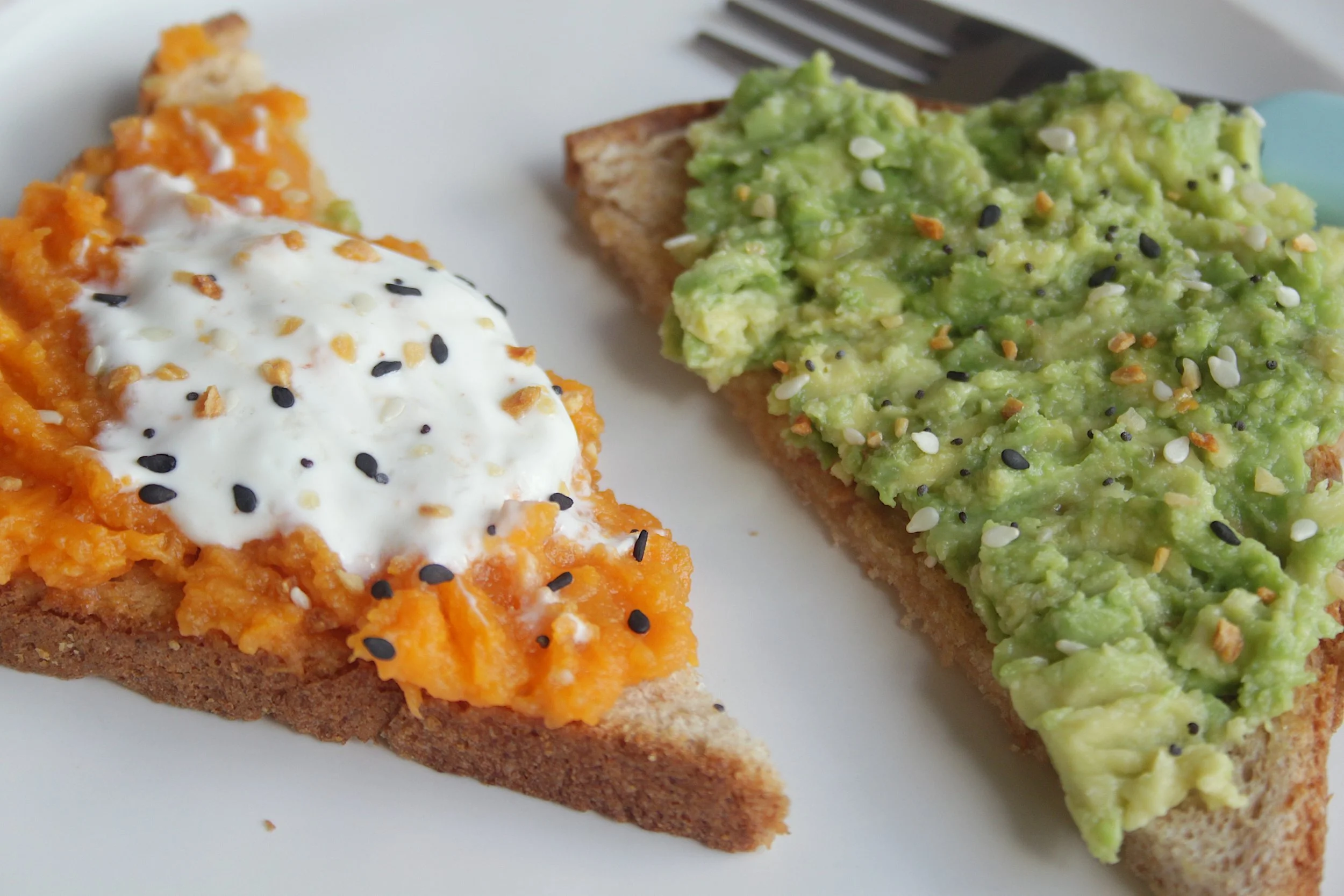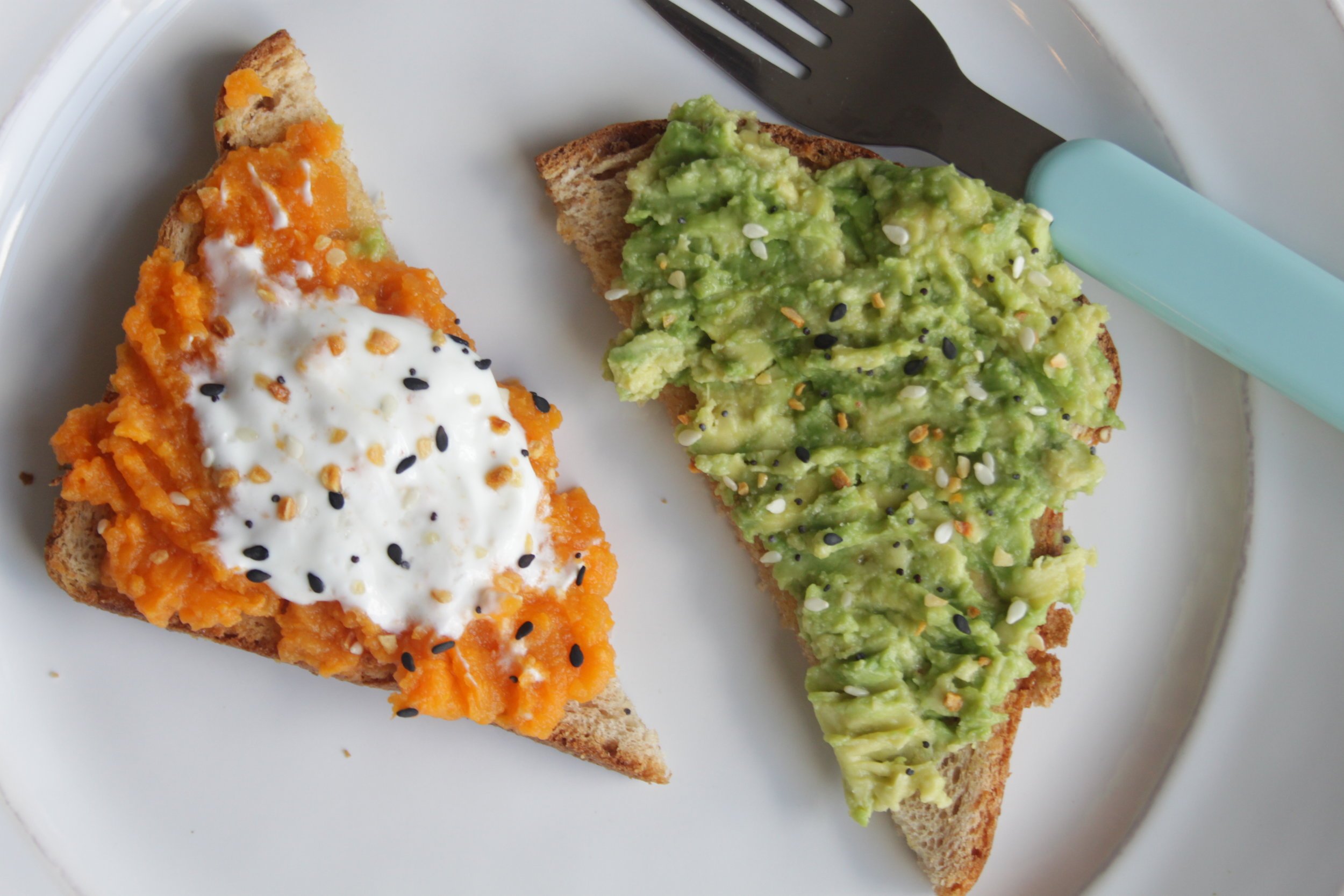Fats Are Essential for Brain Development + Healthy Snack Idea: Sweet Potato and Avocado Toast
It is no secret that adequate fat and cholesterol consumption is they key to healthy brain functioning. Fat is what myelinates nerve cells in the brain, which makes it possible for new neural pathyways to develop (for thinking, remembering, motor planning and learning). But how often do we forget that our children need it even more than we do?
Since children's brains literally D O U B L E in size from birth to age two, they NEED these fats in their diet in order for healthy brain development to occur! The AMDR for fat for children ages 1-3 years is 30-40% of calories.
So this means that if your child is no longer breastfeeding (before turning two), you need to make sure they are consuming adequate fats and oils in their diet. Breastfeeding mothers should also be conscious of consuming adequate fats and oils in their diet, to produce a balanced fat/carbohydrate ratio in breastmilk for baby.
With the chaos of motherhood, it can be hard to remember and brainstorm ideas for healthy fats and oils. Which is why I decided to make a list of my favorite sources of healthy fats for kids (and mamas!) Just remind yourself to look for at least one source of protein, fat and healthy carbohydrate during every meal!
**Affiliate links below
HEALTHY FAT IDEAS FOR KIDS:
Avocados: Avocados are so versatile. You can smash them and make guacamole dip, add guac to toast, chop them and offer them individually or add them to soups.
Cooking with coconut oil and extra virgin olive oil: Cook eggs with added oils, add them to salads or spreads, etc.
Nuts and seeds: Cashews, Almonds, Pumpkin Seeds, Sunflower Seeds, Walnuts, Pistachios **Make sure your child is A) not allergic and B)has the motor skills to chew
Nut Spreads: Almond Butter, Sunflower Seed Butter: **These are great for when baby isn't proficient at chewing nuts quite yet, you can spread it on grain-free or sprouted toast
Animal fats and seafood: wild caught salmon and fish (salmon has one of the highest omega-3 contents of any other fish) smoked salmon slices, grass-fed beef, chicken
Organic dairy: grass-fed butter, ghee and organic dairy such as full fat milk or full fat yogurt.
Pasture raised eggs: So many options for eggs! Scrambled eggs, hard boiled eggs, fried eggs, etc.
Sardines + wild organic canned salmon: A great source of omega-3 fatty acids and calcium and magnesium. You can make a suedo-tuna fish salad or just add them atop avocado toast.
Hemp seeds + chia seeds: These are a great source of omega-3 fatty acids and you can literally add them to everything! You can sprinkle them atop toast with almond butter & honey, put them in yogurt, add them to homemade cookie recipes or add them into smoothies.
Olives: Greek kalamata olives are my favorite but pretty much all olives are great sources of healhy fats.
If you don’t eat fish often, fish oil is a good option! We use this brand at our house. It is SUPER yummy tasting and the kids literally run to get their fish oil!
**Organic dairy products: While the pasteurization and homogenizing process is beneficial for removing harmful bacteria, it also removes essential vitamins and minerals and makes the proteins difficult to digest for many people. Raw organic milk does pose some risks but if you can find a local farm that does a more gentle pasteurization process, this might be a healthier choice than purchasing store bought milk.
SMASHED AVOCADO + SWEET POTATO TOAST:
1 avocado, smashed with salt and pepper
left-over baked sweet potato
sprouted toast
grass-fed butter or ghee - I use Kerrygold
full-fat organic grass-fed plain yogurt - I use Maplehill
trader joes everything but the bagel spice
INSTRUCTIONS:
toast the bread
spread the butter or ghee
add smashed avocado and sweet potato
add yohgurt
sprinkle everything but the bagel spice


